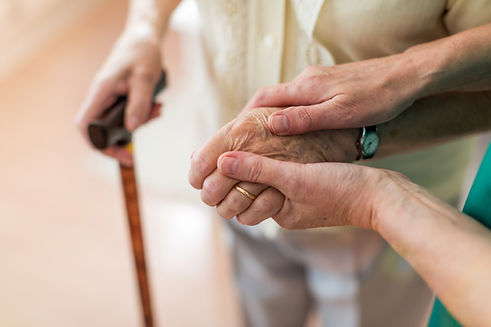DEMENTIA CARE
The best care from a team of dedicated dementia specialists to provide personalised care and support at your home.
Your home, your familiar surroundings are key to reducing distress for anyone with dementia. Disorientation, confusion are common symptoms of dementia. To reduce uncertainty your home environment is the ideal place to receive consistent care support.
As a family run team of dedicated carers, we have a fully trained and experienced workforce who will provide you with personalised home care. We will only match you with one of our dementia specialists, who will become a familiar face, providing you with stability, trust and long term care and support
Everyone in our team have been thoroughly vetted and references checked. They are trained, fully qualified, competent, skilled and experienced to fully support you at home.
The same carer will continue to provide you with one-to-one personalised care and support in the comfort of your own home.

Give Us A Call To Arrange Your Support Today 020 3489 7099

DementiaUK describes dementia “as an umbrella term for a range of progressive conditions that affect the brain. Each type of dementia stops a person’s brain cells (neurones) working properly in specific areas, affecting their ability to remember, think and speak”.
Once we start supporting you, you will continue to be in control of all choices and decisions that are made about your life. You are an equal partner in your care. When your needs change, your care plan will be updated and adjusted to accommodate your changing needs.
Your personalised care may include:
-
Hair, nail and foot care
-
Getting into and out of bed and helping to move positions in bed
-
Toileting and continence support
-
Medication management
-
Daily hygiene: brushing and flossing teeth, bathing and showering, regular hand wash
-
Getting dressed and undressed
-
Engaging in hobbies
-
Regular exercise

PERSONALISED CARE THAT MEETS YOUR NEEDS
A three cord strand is not easily broken
Care is personal, and Dementia care is no different because it is a condition which affects people in different ways, depending on the type of dementia. The impact of dementia can be physical, it can affect your emotional and psychological wellbeing, your social interactions, and changes the practicalities of daily living and independence
At The Three Cord Care, our personalised care focuses on what matters to you: your goals, circumstances, preferences and wishes. We know that you are the best person to decide and plan the care and support you need. We work with you to discover your strengths and abilities and encourage you to make your own decisions.
Give Us A Call To Arrange Your Support Today 020 3489 7099

WE TAKE THE TIME TO
KNOW YOU AND YOUR FAMILY
The Three Cord Care comprises of family members and friends. We are well aware that family involvement is crucial for positive outcomes and enhanced quality of life. We work closely with families, providing regular updates and adapting care plans. This ensures that we work in partnership to design and deliver care and support, where you feel more in control and empowered that alleviates dementia related anxiety and stress for you and family members. are reassuring even if you live far away or in another country.
With the progressive effects of dementia, family involvement will be crucial in providing valuable insights into your preferences, wishes and needs.
Types of Dementia
Dementia is a syndrome: a collection of symptoms that arise from damage to the brain caused by various diseases. These symptoms impact cognitive functions such as thinking, memory, and reasoning and eventually interferes with daily life and activities. Dementia is not a normal part of aging, though it becomes more common with age. It involves a decline in cognitive abilities, such as memory loss, difficulty with language and impaired judgment.
Alzheimer’s Disease
Being the most common type of dementia in the UK. It is caused by a build-up of proteins in the brain which damage the brain cells’ ability to transmit messages. This disease is progressive and tends to get worse over time.
Some of the symptoms:
-
Disorientation
-
Poor concentration
-
Confusion
-
Difficulty remembering recent events (but retaining past events
-
Difficulty performing everyday tasks: cooking, shopping, paying bills
-
Difficulty making decisions
Vascular Dementia
This is the second most common type of dementia and caused by problems in the supply of blood to the brain.
Vascular damage can also take place in the smaller vessels of the brain with gradual symptoms.
Some of the symptoms, similar to Alzheimer’s, but may include:
-
Difficulty with language, reading, writing and walking
-
Mood swings: irritability, anxiety or apathy
-
Disorientation and confusion with time, place or identity
-
Slowness of thought: slowing down of thinking processes
-
Difficulty in bladder control
Lewy body dementia
With this condition memory is often less affected than other types of dementia.
Lewy body dementia affects body movement and motor control (the ability to control voluntary movements for tasks).
Some of the symptoms:
-
Shuffle when walking
-
Tremors (shaking, trembling, stiffness, difficulty with balance)
-
Prone to falls, unsteadiness and fainting
-
Difficulty with swallowing
-
Visual and auditory hallucinations (seeing things that are not there)
Disrupted sleep patterns due to
intense dreams/ nightmares.
Frontotemporal dementia
This type of dementia affects the frontal lobes of the brain, the part that controls behaviour, learning, personality and emotions.
Although it can affect people of all ages, but is more common to the 45-65 age group, than those over 65 years.
Some of the symptoms:
-
Lack of inhibitions
-
Changes in social behaviour (loss of empathy)
-
Changes in eating patterns (compulsive behaviours)
-
Apathy and loss of motivation
-
Difficulty remembering appearing later
DEMENTIA CARE PLANNING
Our Dementia care specialists are on hand to provide you with information about advice and support services in your area, including NHS services, social services, charities and voluntary organisations.
Most importantly, you can speak to us about any aspect of dementia because we know that every circumstance is unique and there will be different considerations based on the care and support you need.
Our dementia care services are fully monitored, inspected and regulated by the independent regulator of health and adult social care in England, the Care Quality Commission (CQC).


